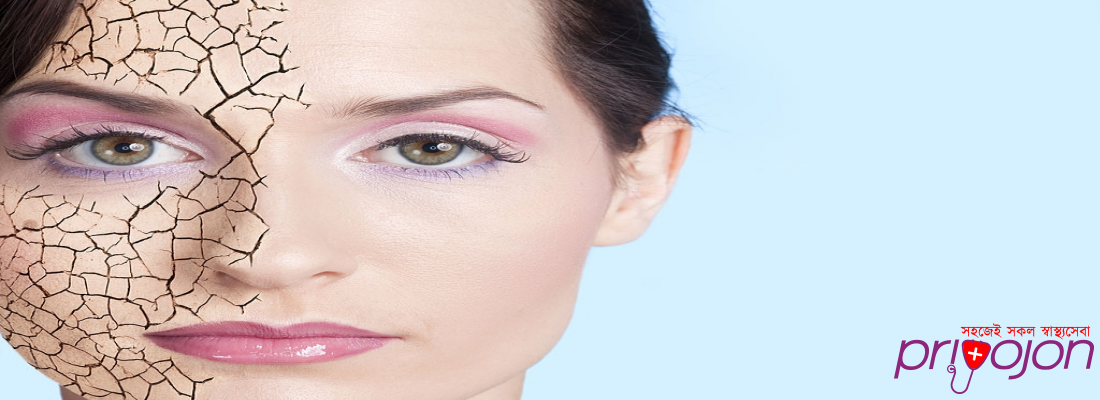Shared on 08-04-2020
Dry Skin - 6 Ways to Treat It!
Dry Skin - 6 Ways to Treat It!

Dry skin refers to the lack of moisture within the skin, specifically within the layer known as the epidermis. Dry skin is a fairly common condition resulting in the flaking of skin. The abnormal lack of moisture in skin can be caused by several influencing factors.
The loss of moisture:
Dry skin may be mild, where it may last for a few days to severe, where it lasts for prolonged periods of time. This tends to become increasingly common with age. Although normally having dry skin is a common skin type, abnormally low moisture content in the skin might become a serious and chronic condition leading to many problems.
Causes of dry skin
1. Dry skin might be caused by winter weather or dry and harsh climatic conditions
2. Bathing or washing skin frequently with rough soap,
3. Severe deficiency of vitamin A
4. Using hot water for showers for prolonged periods of time
5. Individuals with eczema are more prone to dry skin and may lead to several bacterial infections as well
6. Underlying physical disorders such as hypothyroidism and diabetes may also be contributing factors.
7. Medication for lowering lood pressure, cholesterol and removing acne may also lead to the dryness of the skin.
The symptoms of dry skin include
1. Itchiness and discomfort
2. Tightness of skin
3. Continuous scratching
4. The appearance of white lines on scratching
5. Extremely dry skin may result in the cracking or breaking of the skin causing pain and discomfort
6. Skin that easily bruises with minor abrasions
Treatment
Dryness of skin is very common and can be treated easily. However, extreme dryness can lead to severe discomfort of the skin and cause infections and skin diseases. Visiting a dermatologist is always preferred in such cases.
1. Certain preventive steps you can take to prevent the occurrence of dry skin along with some treatment options are mentioned here.
2. Temporary dry skin may be treated with the use of lotion. Frequent moisturizing also helps.
3. It is also advisable to drink a lot of water and avoid soaps that suck moisture out of your skin.
4. You should also try and increase the intake of food rich in Vitamin A. Carrots, spinach, tomatoes, zucchini, celery, are good examples of such food.
5. Natural oils may also be used to temporarily remove the dryness in the skin. Regular massages and frequent application of moisturizing agents always helps.
6. You should also switch to bathing in cool or lukewarm water.
If the problem seems to persist, consult a dermatologist for further consultation. Special medicated lotions are often prescribed to deal with dry skin. Anti-itching lotions may also be prescribed by dermatologists along with certain oral medications for rare cases.
Dry skin refers to the lack of moisture within the skin, specifically within the layer known as the epidermis. Dry skin is a fairly common condition resulting in the flaking of skin. The abnormal lack of moisture in skin can be caused by several influencing factors.
The loss of moisture:
Dry skin may be mild, where it may last for a few days to severe, where it lasts for prolonged periods of time. This tends to become increasingly common with age. Although normally having dry skin is a common skin type, abnormally low moisture content in the skin might become a serious and chronic condition leading to many problems.
Causes of dry skin
1. Dry skin might be caused by winter weather or dry and harsh climatic conditions
2. Bathing or washing skin frequently with rough soap,
3. Severe deficiency of vitamin A
4. Using hot water for showers for prolonged periods of time
5. Individuals with eczema are more prone to dry skin and may lead to several bacterial infections as well
6. Underlying physical disorders such as hypothyroidism and diabetes may also be contributing factors.
7. Medication for lowering lood pressure, cholesterol and removing acne may also lead to the dryness of the skin.
The symptoms of dry skin include
1. Itchiness and discomfort
2. Tightness of skin
3. Continuous scratching
4. The appearance of white lines on scratching
5. Extremely dry skin may result in the cracking or breaking of the skin causing pain and discomfort
6. Skin that easily bruises with minor abrasions
Treatment
Dryness of skin is very common and can be treated easily. However, extreme dryness can lead to severe discomfort of the skin and cause infections and skin diseases. Visiting a dermatologist is always preferred in such cases.
1. Certain preventive steps you can take to prevent the occurrence of dry skin along with some treatment options are mentioned here.
2. Temporary dry skin may be treated with the use of lotion. Frequent moisturizing also helps.
3. It is also advisable to drink a lot of water and avoid soaps that suck moisture out of your skin.
4. You should also try and increase the intake of food rich in Vitamin A. Carrots, spinach, tomatoes, zucchini, celery, are good examples of such food.
5. Natural oils may also be used to temporarily remove the dryness in the skin. Regular massages and frequent application of moisturizing agents always helps.
6. You should also switch to bathing in cool or lukewarm water.
If the problem seems to persist, consult a dermatologist for further consultation. Special medicated lotions are often prescribed to deal with dry skin. Anti-itching lotions may also be prescribed by dermatologists along with certain oral medications for rare cases.
Popular Health Tips
...
...
Medically reviewed by
Mrs Dr. Nazneen Sultana
MBBS, Trained on Sonologist
10 Years of Experience
- Written by the Priyojon Editorial Team

